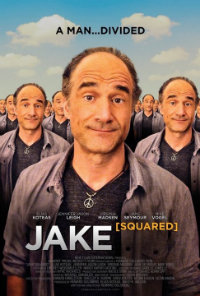Multiplicity: Goldberg’s Latest a Mediocre Mash-up of the Masculinity Affliction
 A handful of exquisite references are bound to crop up in a discussion of Howard Goldberg’s third directorial effort, Jake Squared, which proves to be the helmer’s first stint behind the camera since 1996 indie flick, Eden. However, Goldberg’s work doesn’t stand as an equal to a bevy of obvious influences utilized in the film, from any number of Woody Allen’s nebbish protagonists, to Fellini’s autobiographically inclined 8½. Abundant quotes flash across the screen from a series of additional notables, the least of which include Jean Cocteau and Groucho Marx. And yet, for all the inspired quirks, Goldberg’s material is never elevated beyond banal cliché, despite a cavalcade of names and an energetic lead performance.
A handful of exquisite references are bound to crop up in a discussion of Howard Goldberg’s third directorial effort, Jake Squared, which proves to be the helmer’s first stint behind the camera since 1996 indie flick, Eden. However, Goldberg’s work doesn’t stand as an equal to a bevy of obvious influences utilized in the film, from any number of Woody Allen’s nebbish protagonists, to Fellini’s autobiographically inclined 8½. Abundant quotes flash across the screen from a series of additional notables, the least of which include Jean Cocteau and Groucho Marx. And yet, for all the inspired quirks, Goldberg’s material is never elevated beyond banal cliché, despite a cavalcade of names and an energetic lead performance.
A 50 year old filmmaker in Hollywood, Jake Klein (Elias Koteas), credits himself as a hopeless romantic, yet has never been able to successfully settle down. Uninspired and trying to figure out where he went wrong, he decides to make a movie about his life using the house he lives in, hiring an actor (Mike Vogel) to portray himself. But as filming commences, at first revolving solely around a party at Klein’s home where his alter ego hops endlessly into a backyard hot tub filled with sexy women, the process is interrupted by actual versions of Jake’s younger self, at 17, 30, and 40 years of age (with only the seventeen year old being played by an alternate actor, Kevin Railsback). These other Jakes interact with fake Jake and a host of other personalities that show up from various parts of Jake’s life, including the grown-up version of Joanne (Jane Seymour), who his 17 year old self met at the party when she was a teenage girl (Liana Liberato). Then, there’s his best gal pal Beth (Virginia Madsen), the mother of his children (Susan Traylor), and current long distant flame Sheryl (Jennifer Jason Leigh). Plenty of interactions directly with the camera from the main Jake gives the film a faux documentary feel.
In 2012, Goldberg attempted to raise 50K for the feature via Kickstarter, and managed to raise just a titch over half that amount. Despite the failure to secure the funds, Goldberg, perhaps unwisely, went ahead with the project anyway. While it has received a warm welcome at a cadre of minor film festivals, there’s a resoundingly cheap feel to Jake Squared, and though it manages to balance a ludicrous and cluttered narrative without slipping into endless confusion, it never seems to have a wholly original idea of its own.
Its imponderous qualities relegate it as a prime example of the type of moderately serviceable and feckless material sought out by audiences looking for easy validations of the status quo. It’s a pity considering Elias Koteas is an enigmatic screen presence often relegated to character actor status in a cornucopia of genre films when he’s not being cherry-picked by Canadian auteurs like Egoyan and Cronenberg. His three renditions of Jake have a type of buoyancy, but it’s a pity the character is so damned maudlin, a non-entity in a sea of clichéd mid-life crises movie men that can’t figure out why their eternal philandering always keeps lasting relationships at bay. And no, his final revelation isn’t any more inspired than the platitudes lodged in all the goofy distractions.
Why a covey of women portrayed by the likes of Jane Seymour, Jennifer Jason Leigh, and Virginia Madsen would be fascinated by the mediocrity of a man like Jake Klein isn’t realistically explored. Instead, this feels like one long running gag of a male fantasy run amok. A host of nameless, nubile young women clustered around droopy old men in a hot tub and way too many sequences shot at Runyon Canyon belie the uninspired measliness of the entire affair. A quote from Fellini opens the film, citing “the pearl is the oyster’s autobiography.” If we’re comparing Jake Squared to a mollusk’s innards, it’s more akin to a clam’s foot, moving the vessel about from place to place but never farther than it has to.
★½/☆☆☆☆☆


